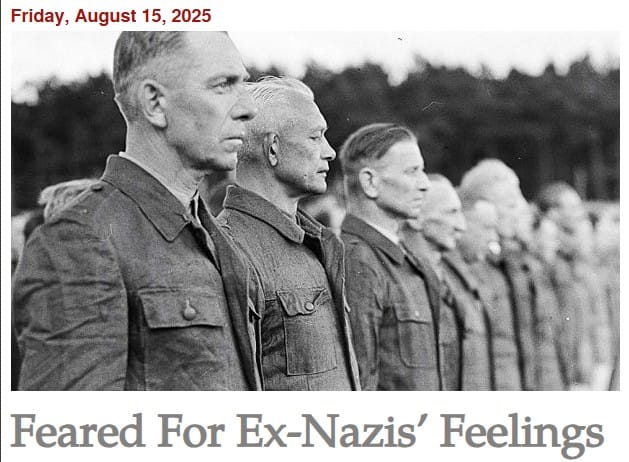Blacklock’s Reporter
Friday, August 15, 2025
https://www.blacklocks.ca/feared-for-ex-nazis-feelings/


Federal agencies are concealing names of Nazi collaborators let into postwar Canada for fear that disclosure “might cause them harm,” a B’nai Brith Canada executive said last evening. The advocacy group has asked a federal judge to quash secrecy orders on decades-old files.
“We’re talking about records from the 1940s and ‘50s about individuals who have long since been dead,” said Richard Robertson, director of research for B’nai Brith. “One of the exemptions that is continuously being used against us is it might cause them harm if we release this information.”
“I think we have to balance whether or not you can harm a former Nazi but also whether or not you can harm someone who has been deceased for a number of years,” said Robertson. “At what point do we stop caring about the impact this might have on a person who’s been deceased for several decades?”
B’nai Brith has sought documents sealed by a 1986 Commission of Inquiry on War Crimes led by Québec Court of Appeal Justice Jules Deschenes. Counsel for the group in a January 27 Federal Court application said archivists “acted unreasonably and unlawfully” in withholding Nazi blacklists under the Access To Information Act.
“We’ve been fighting this battle for quite some time,” said Research Director Robertson. He spoke in a B’nai Brith videoconference.
“One of the reasons why the government hasn’t released the reports, one of the exemptions they rely on is that it may impact a foreign ally,” said Robertson. “One of the concerns is that might be the Ukrainian community here in Canada.”
“Because they haven’t released that information, probably in the reverse effect of what the government was intending, the Russians have come out and said Canada is harbouring these Nazi secrets and it has to do with the Ukrainian community, and they actually have used that to advance their rhetoric that Ukraine is a fascist state and has a Nazi history,” said Robertson.
Disclosure “A Pain”
Access To Information records show the Ukrainian Canadian Congress petitioned federal agencies against disclosing the names of wartime collaborators. Renewed calls for release of the records followed a public outcry over the Commons’ mistaken 2023 tribute to a Ukrainian-Canadian volunteer with the 14 Waffen Grenadier Division of the SS. The Division was named a criminal organization at the 1946 Nuremberg Tribunal.
The Ukrainian Canadian Congress in testimony last October 1 at the Commons public safety committee said naming names would upset the community. “Today we hear repeated calls for the disclosure of the names of these innocent people,” said Alexandra Chyczij, then-president of the Congress.
Matt Malone, academic partner with the Investigative Journalism Foundation, last evening said continued concealment of Nazi files was extraordinary. “Once classified, always classified,” he said.
“Astoundingly in my opinion, you have organizations like B’nai Brith that are trying to get records of the Commission of Inquiry on War Criminals in Canada from World War Two, an issue of extreme public interest, where the government has dragged its feet and refused to release basic information,” said Malone. The Department of Justice “is spending resources to go to court to prevent B’nai Brith from getting access to that information,” he said. “This is a very astounding situation.”
Artur Wilczynski, former director general with the Department of Public Safety, told the B’nai Brith conference that sealing records 80 years after the war’s end was bizarre. “The fact that stuff that was discussed in the 1940s is still considered top secret is just bizarre,” he said. “Quite frankly, things that are 60, 70 years old, there should be an automatic release of that information unless someone puts in a specific argument for why that information should remain classified.”
“Folks see the disclosure of information as a pain,” said Wilczynski. “It distracts from what they want to be focused on into something that potentially, for example, has media attention.”
By Staff 

